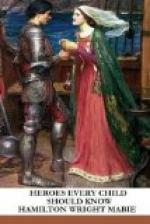An English gentleman after visiting President Washington wrote, “There was a commanding air in his appearance which excited respect and forbade too great a freedom toward him, independently of that species of awe which is always felt in the moral influence of a great character. In every movement, too, there was a polite gracefulness equal to any met with in the most polished individuals of Europe, and his smile was extraordinarily attractive. ... It struck me no man could be better formed for command. A stature of six feet, a robust but well—proportioned frame calculated to stand fatigue, without that heaviness which generally attends great muscular strength and abates active exertion, displayed bodily power of no mean standard. A light eye and full-the very eye of genius and reflection. His nose appeared thick, and though it befitted his other features was too coarsely and strongly formed to be the handsomest of its class. His mouth was like no other I ever saw: the lips firm, and the under-jaw seeming to grasp the upper with force, as if its muscles were in full action when he sat still.”
Such Washington appeared to those who saw and knew him. Such he remains to our vision. His memory is held by us in undying honour. Not only his memory alone but also the memory of his associates in the struggle for American Independence. Homage we should have in our hearts for those patriots and heroes and sages who with humble means raised their native land-now our native land—from the depths of dependence, and made it a free nation. And especially for Washington, who presided over the nation’s course at the beginning of the great experiment in self-government and, after an unexampled career in the service of freedom and our humankind, with no dimming of august fame, died calmly at Mount Vernon—the Father of his Country.




